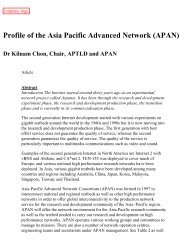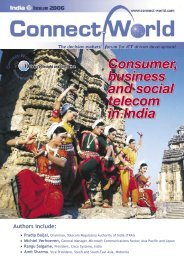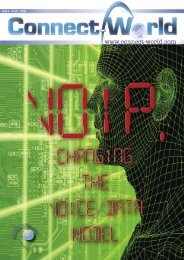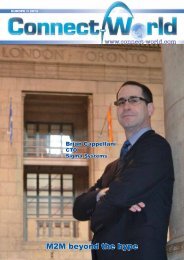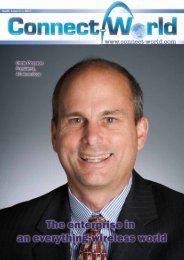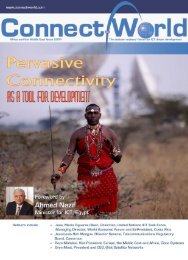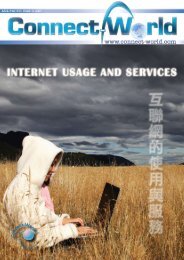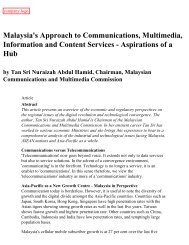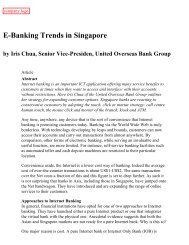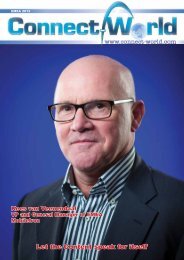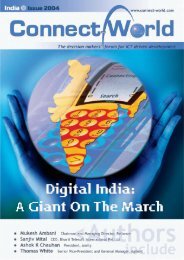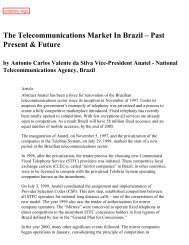Contents - Connect-World
Contents - Connect-World
Contents - Connect-World
Create successful ePaper yourself
Turn your PDF publications into a flip-book with our unique Google optimized e-Paper software.
National Development<br />
Pervasive connectivityTowards building a knowledge<br />
society in Malaysia<br />
by The Honourable Dato’ Seri Dr Lim Keng Yaik, Minister of Energy, Water and Communications, Malaysia<br />
Malaysia needs to build its ICT infrastructure and increase the effective use of information<br />
technology. The government is guiding the countrys transition from a low technology,<br />
labour-intensive economy to a high value-added economy. It is extending access to<br />
all segments of society, from school children to senior citizens, urban and rural residents,<br />
to businessmen and housewives. To create a critical mass of users and applications,<br />
Malaysia has provided access in government departments, schools, universities, research<br />
institutions, hospitals and clinics, libraries and community centres.<br />
The Honourable Dato Seri Dr Lim Keng Yaik, is the Minister of Energy, Water and Communications of<br />
Malaysia. He is the President of the Peoples Movement Party (Gerakan), within the National Front governing<br />
party of Malaysia. Honourable Dato Seri Dr Lim Keng Yaik was appointed a Senator in 1972<br />
and a Minister with Special Functions in the Malaysian Cabinet. Dr Lim Keng Yaik later served in the<br />
State Government of Perak, but returned to the Federal Cabinet as Minister of Primary Industries. Dr<br />
Lim Keng Yaik has participated in international conferences including the GATT Negotiations, Rio Earth<br />
Summit, Cairns Group Meeting and many others. Honourable Dato Dr Lim Keng Yaik served as the<br />
Chairman of the Associations of Tin Producing Countries and Vice-President of the <strong>World</strong> WUSHU<br />
Federation, among others. Dr Lim Keng Yaik led the Malaysian delegation in the negotiations for the<br />
Forest Principles at the Rio Earth Summit and has actively participated in international Forests and<br />
Timber conferences.<br />
Honourable Dato Dr Lim Keng Yaik graduated with a degree in Medicine and Surgery from Queens<br />
University, Belfast, Ireland and was awarded an Honorary Doctorate of Law by Queens University of<br />
Belfast, Ireland.<br />
Harnessing ICT for<br />
Malaysias future<br />
In an era that fosters a knowledgebased<br />
economy, the role of information<br />
and communications technology<br />
(ICT) is increasingly pervasive. This is<br />
particularly so in the Malaysian context<br />
with the government determined<br />
to hasten the development of a vibrant<br />
and dynamic information and knowledge-based<br />
economy and society<br />
through the use of ICT.<br />
The Multimedia Super Corridor<br />
(MSC) launched in 1996, was conceived<br />
to provide the impetus for the<br />
Malaysian information economy and<br />
remains a driving force towards pervasive<br />
connectivity today.<br />
Since its launch, the MSC has generated<br />
21, 200 knowledge worker jobs and<br />
sales of RM5.8 billion (US$1.5 billion)<br />
in 2003 or 1.5 per cent contribution to<br />
GDP and 0.2 per cent of the labour<br />
force. As a starter, the MSC has done<br />
well, considering that it was set up to<br />
be a test bed for new applications and<br />
to attract foreign investment in high<br />
technology. However, more remains<br />
to be done. The second phase rollout<br />
of the MSC will feature MSC status<br />
incubation in the Bayan Lepas Free<br />
Industrial Zone in Pulau Pinang and<br />
the Kulim High-Technology Park in<br />
Kedah. This phase aims to add<br />
100,000 high value-added jobs to the<br />
MSC.<br />
MSC development should not stop<br />
here. Industrial incubation has to<br />
accelerate nationwide to spur take-up<br />
of ICT by all Malaysians and businesses<br />
to reap the benefits of productivity<br />
gains, competitive business advantage,<br />
opportunity for innovation and<br />
growth towards a knowledge economy.<br />
Collaborative efforts to<br />
leapfrog national development<br />
The transition from a low technology<br />
and labour-intensive economy to a<br />
high value-added economy would produce<br />
great economic rewards.<br />
Nevertheless, achieving a knowledge<br />
economy requires national effort, in<br />
which, all stakeholders—the government<br />
and private sector, consumers<br />
and businesses—need to address the<br />
pressing issues of pervasive connectivity.<br />
The government and private sector<br />
need to provide consumers and businesses<br />
alike with the necessary communications<br />
services at acceptable<br />
quality and price. The public and consumers<br />
need to embrace ICT, use it to<br />
their advantage and make it part of the<br />
very fabric of our society.<br />
Spearheading connectivity<br />
The challenge of getting everyone in<br />
Malaysia connected today is to provide<br />
users with affordable access. The<br />
ability of broadband to narrow the<br />
digital divide need not be debated,<br />
given the experience of users throughout<br />
the world. Widespread use of<br />
broadband for high speed Internet is<br />
11



